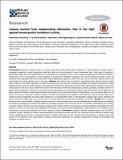| dc.contributor.author | Mobegi, Duke | |
| dc.contributor.author | Chongwe, Emmanuel | |
| dc.contributor.author | Sakanga, Viviane | |
| dc.contributor.author | Zulu, Robert | |
| dc.contributor.author | Mubiana, Inambao | |
| dc.date.accessioned | 2022-01-26T21:32:04Z | |
| dc.date.available | 2022-01-26T21:32:04Z | |
| dc.date.issued | 2020-09-25 | |
| dc.identifier.citation | Nyirenda HT, Mubita B, Choka N, Mulenga D, Kapesha R, et al. (2020) Postpartum Depression among Postnatal Women as a Result of Disrespect and Abuse During Labour and Delivery. J Preg Child Health 03: 109. DOI: 10.29011/JPCH-109.100009 | en_US |
| dc.identifier.other | DOI: 10.29011/JPCH-109.100009 | |
| dc.identifier.uri | https://repository.amref.ac.ke/handle/123456789/538 | |
| dc.description | Nyirenda HT, Mubita B, Choka N, Mulenga D, Kapesha R, et al. (2020) Postpartum Depression among Postnatal Women as a Result of Disrespect and Abuse
During Labour and Delivery. J Preg Child Health 03: 109. DOI: 10.29011/JPCH-109.100009 | en_US |
| dc.description.abstract | Introduction: Evidence suggests that health care providers habitually fail to provide respectful maternity care during facilitybased
delivery. This study explored the relationship between disrespect and abuse experienced by women during child birth
and postpartum depression.
Methods: This was a cross-sectional study targeting women attending postnatal services within 28 days of delivery preceding
the survey. A random sample of 306 women from 20 health facilities were selected and interviewed. Self-reported disrespect
and abuse included physical abuse, non-consented care, non-confidential care, verbal abuse, and discrimination based on
specific attributes. The Edinburgh Postnatal Depression Scale (EPDS) was used to assess postpartum depression.
Results: Findings reveal that 13% and 12% of the women had mild and severe symptoms of emotional distress respectively.
One third (33%) experienced at least one form of disrespect and abuse. Further, the risk of having severe emotional distress
symptoms was; (RRR=2.52, 95%CI: 1.256 - 5.057); (RRR=1.90, 90%CI: 0.905 - 3.985); (RRR=2.23, 90%CI: 0.874 - 5.669);
(RRR=2.32, 95%CI: 1.146 - 4.692) and (RRR=4.41, 99%CI: 1.769 - 10.980) times higher for women who experienced; Physical
abuse; Non-confidential care; Non-dignified care; Abandonment or denial of care; and Detention in facilities respectively.
Similarly, the risk of having mild emotional distress was (RRR=2.44, 95%CI: 1.201 - 4.939) and (RRR=2.34, 95%CI: 1.176 -
4.672) times higher for women who experienced; Non-confidential care and Abandonment or denial of care respectively.
Conclusion: Disrespect and abuse during Labour and delivery have potential of crafting adverse health outcomes such as
postpartum depression hence negative child birth experiences defile the fundamentals for healthy motherhood.
Recommendation: There is need to address the various forms of disrespect and abuse in order to ensure respectful maternity care
and elude the potential adverse outcomes of postpartum depression. Postnatal services should incorporate critical assessment of
signs of mental illness among women for early intervention | en_US |
| dc.description.sponsorship | Amref Health Africa | en_US |
| dc.publisher | GAVIN PUBLISHERS | en_US |
| dc.subject | Maternity care | en_US |
| dc.subject | Health facilities | en_US |
| dc.subject | Child birth | en_US |
| dc.subject | Emotional distress | en_US |
| dc.subject | Maternity care | en_US |
| dc.title | Postpartum Depression among Postnatal Women as a Result of Disrespect and Abuse during Labour and Delivery | en_US |
| dc.type | Article, Journal | en_US |

